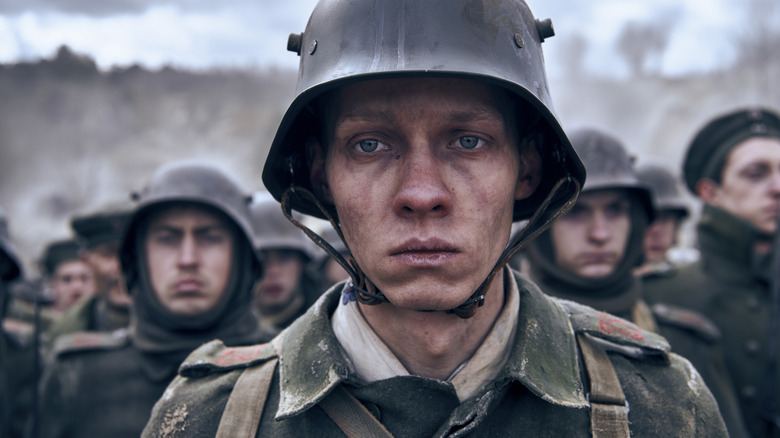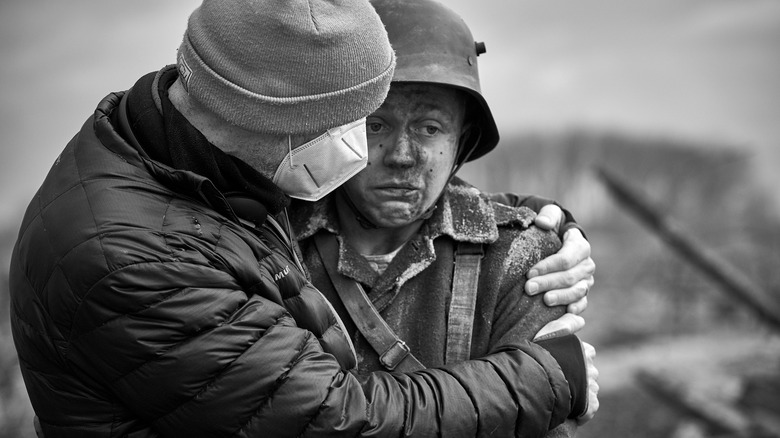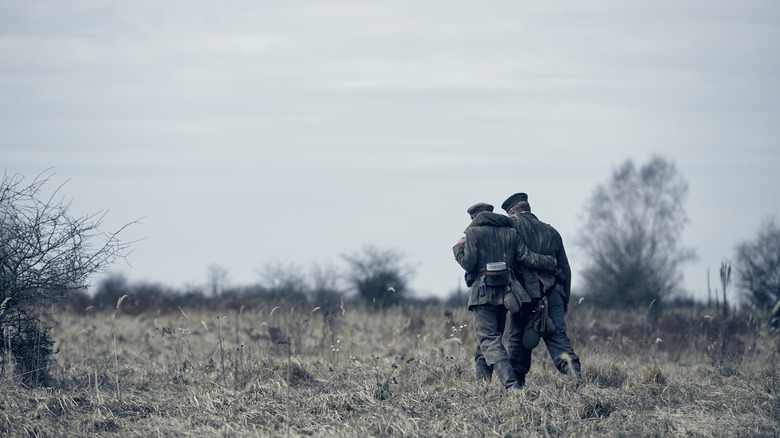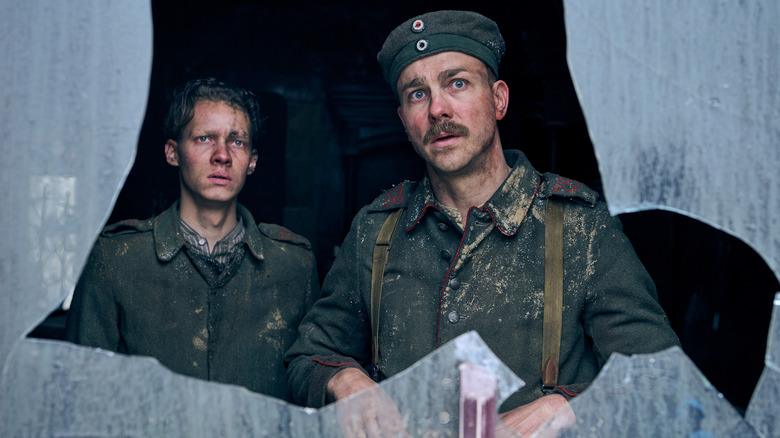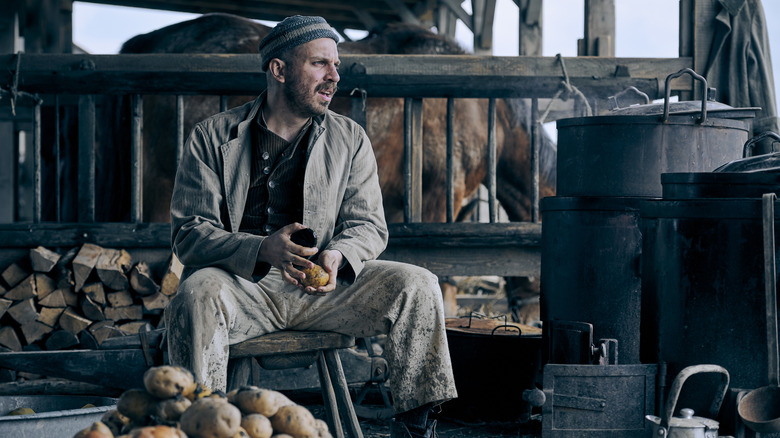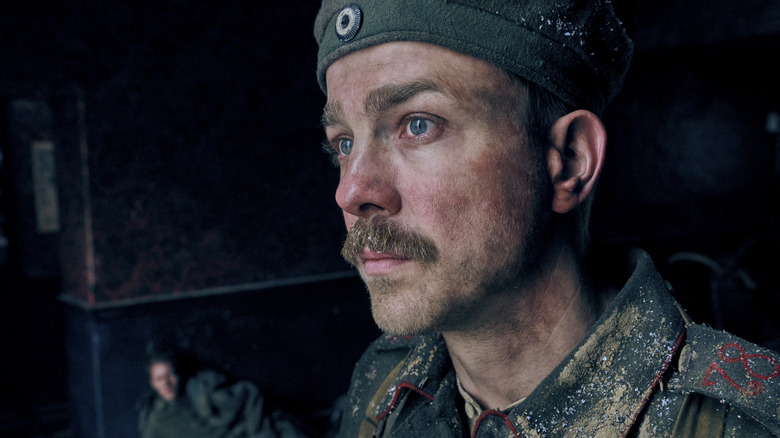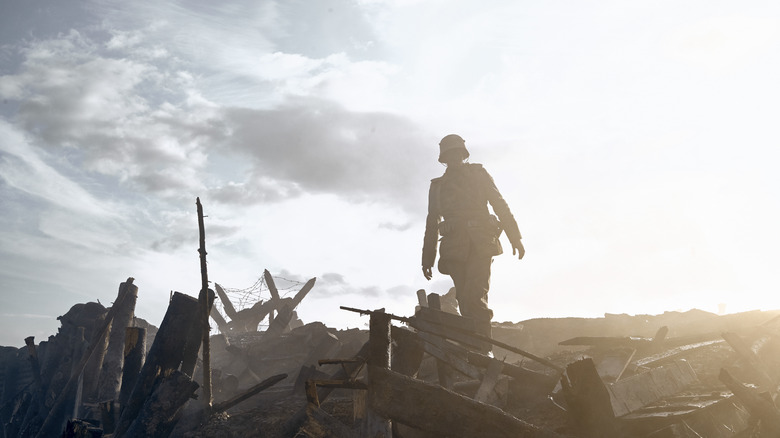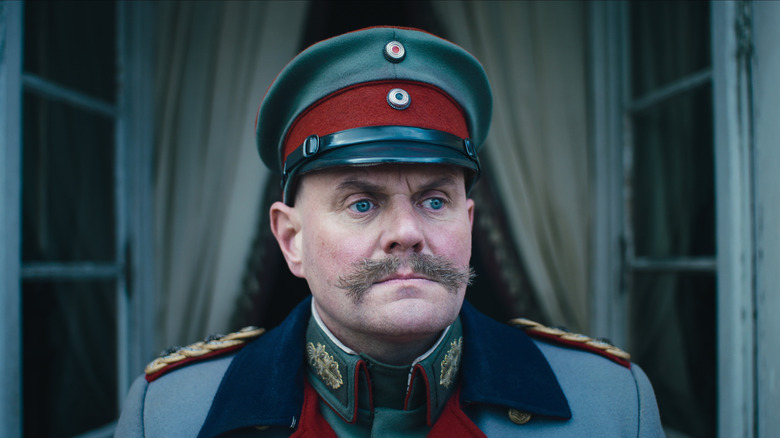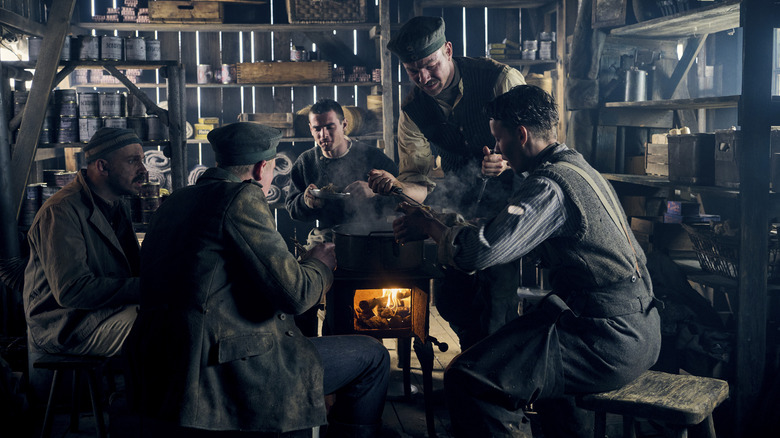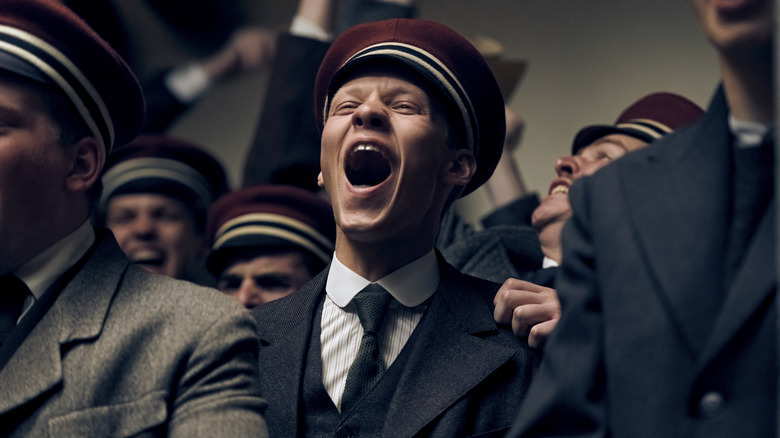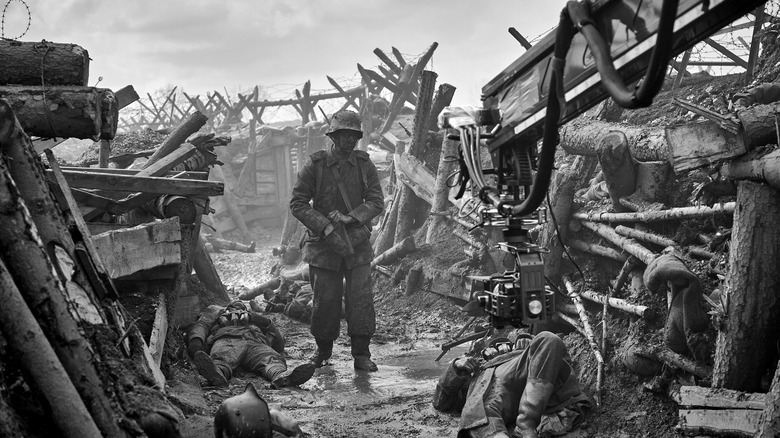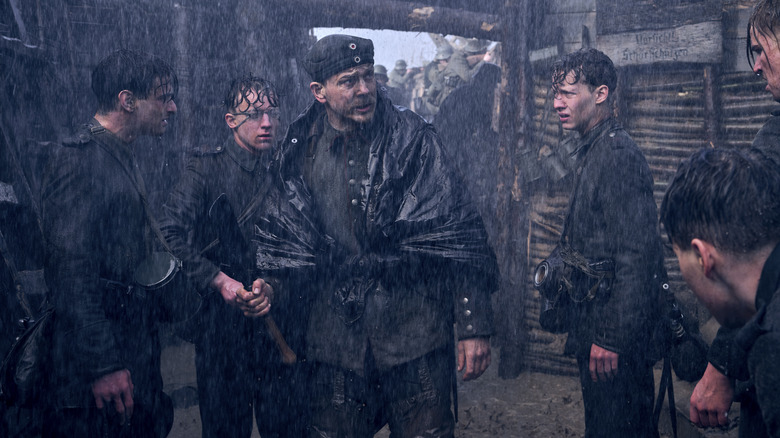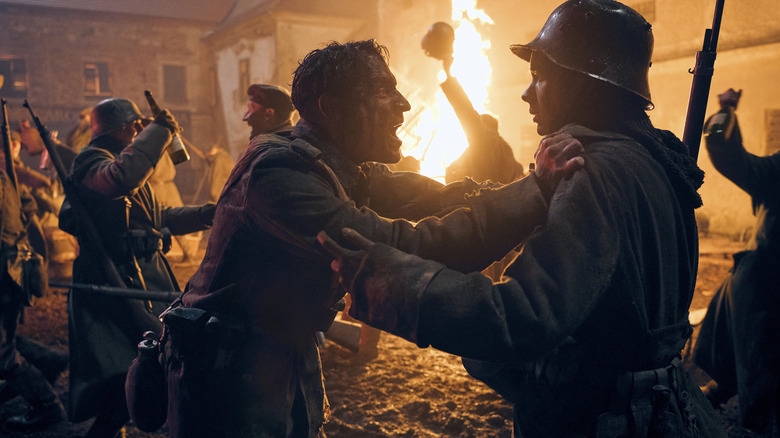All Quiet On The Western Front Director Edward Berger Wanted A Different Kind Of War Film [Exclusive Interview]
War is hell, but many depictions of war are focused on the heroics involved. Even the most brutal and heart-wrenching war cinema classics, like "Saving Private Ryan," have an element of heroism embedded within the narrative that makes them ultimately a story of human perseverance. The 1929 German novel "All Quiet on the Western Front," written by World War I veteran Erich Maria Remarque, doesn't have any of that. This isn't a story that inspires or shows patriotism, but instead depicts the horrors of war in the intimate way only survivors of the battlefield can. When German director Edward Berger took on the challenge of adapting the novel into a film for the 21st century, he knew that he wanted to make it as true to the novel as possible, creating an anti-war message for the ages. The film follows Paul (Felix Kammerer), a 17-year-old who signs up for the German army with big hopes of glory and soon finds out there's none to be found.
I sat down via Zoom with Berger to discuss this beautiful, haunting film and how he managed to pull it off. "All Quiet on the Western Front" is one of the most harrowing cinematic experiences I've had in a long time, and that was clearly Berger's intent. Read on to learn all about how the cinematography, sound design, and storytelling came together to make this masterful film.
'I really like taking on things I know I could possibly fail at'
Note: This interview has been lightly edited for clarity and brevity.
"All Quiet on The Western Front" is about as far as you can get from your previous film, "All My Loving." What drew you to this story?
That it is far away from the last film. I really like contrast, and I really like challenges that I haven't done before, and I really like taking on things that I know I could possibly fail at, and challenges that hopefully make me rise to the occasion. But also, it's a very big book in Germany, it's written by a German novelist, and it just felt like the right time and the right moment to make this film in German.
'It's part of our national treasure, it's part of our culture'
What was your relationship to the book before doing this movie?
I'd read it when I was 17 or so, somewhere there, then again somewhere in my early 20s, and then not for 20 years. And so, when Malte Grunert, the producer, called me, [it had been a while] but the book was so in me. It was so much part of me that when he called me, I immediately thought, "Wow, why has it been sitting there? No one's thought of this, and why haven't I thought of it?" It just felt so right and so ready to harvest. It's part of our national treasure, it's part of our culture. And so, to make this book and turn it into a German language film just felt like the right moment.
But also, by the way, when I do these things, I go home usually and I talk about it with the family. And I sit at the kitchen table, and my kids then get up and think, "Another movie, how boring." But this time, I mentioned the title, and my daughter whipped around and said, "'All Quiet on the Western Front?' I just read it in school. You absolutely have to make it. It's the book that moved me most. I cried five times and this is such an opportunity."
And I thought, "If 90 years after the first publication of this book, a young woman, a young girl of 17, the book still has such an impact on her, I mean it still must be relevant." And so, that was also a big reason.
'There's nothing honorable or to be proud about in terms of that part of German history'
I was wondering if you looked to the two English-language adaptations for any inspiration of what to do or what not to do, or if you really just wanted your version to stand on its own?
To me, I never thought of it as a remake, so it just felt like a new adaptation of the German novel. So, it's really on its own. Obviously, I had seen the first movie, because it's brilliant, and I saw it again before I started rewriting the script. And I actually had to put the script away for two weeks because I really ... it puts doubts into your mind. You think, "Why am I making this?" By the way, the '70s version I never watched, because I was told it's not very good. If you watch too many of these things, they creep into your mind. You can't get rid of them, so I just didn't watch it and just concentrated on the book.
But the big motivation and the big reason was, whenever I watch American or British war films, including the original 1930s version, the feeling underneath it is just so different. Because obviously, you're allowed to tell a hero's story. You're allowed to tell a story of people that also did something with purpose that were probably broken just as much as soldiers from other countries, but they were allowed to heal. They had a sense of pride and a sense of honor about what they did. There's nothing honorable or to be proud about in terms of that part of German history. So, you can just feel shame and guilt and terror and a sense of responsibility towards that history. And I feel it. It's in my DNA, and that made the film. That made me make the film, and that influences every decision that you take while making the film. Hopefully, that leads to a very different film than the American version of it, or any other American war film.
'That contrast is a big theme in the film'
The opening sequence really blew me away, because it contains foxes nesting underground, and it feels like such a contrast to the violence to come. Was there an intention to compare that foxhole to the foxholes we were about to see in the trenches?
Oh, I never thought of the word foxhole, because it's an English word. It's not a German word. But it's basically an image of warmth, of the promised land, of where we want to get back to, and where we come from, and that we lose at some point that we're trying to regain and can probably never reach. That warmth, that family ... and that what we destroy. And so, that's where that came from. And hopefully, a sense of poetry about it, too. But that's where it came from, not from the word foxhole. [laughs]
I noticed there are a lot of scenes of nature in this, just beautiful landscapes. And you don't really see those in war movies. Was that part of your intention of showing what we've lost?
Absolutely. What we've lost, or what we're destroying, and the sense of also, "God, it could be so easy," right? If we just left it in peace. And also a sense of contrast between peace and quiet and loudness and chaos and terror and destruction. That contrast is a big theme in the film, and in sound design and camera design, and so that just became part of the visual language in terms of ... yeah. You put it perfectly. We lost it, or we're in danger of losing it, or a place of longing of where we want to get back to.
'When I use color, I just use strong color'
A lot of war films, especially more American or English war films, are really desaturated. They have that greenish gray newsreel look. But "All Quiet on the Western Front," there's some color, it's beautiful. You've got a lot of blues and reds, and I was wondering what your plan for that color palette was?
Well, I generally like color in terms of when I use color, I just use strong color. And again, it's about contrast, about not washing everything out. And I think it's part of the effort, also, to make it feel visceral and physical. To make it feel like we're right in the middle of it, and an attack on our senses, almost.
This sounds maybe terrible, but I recently discovered on my desktop a little quote that I had cut out, a frame grab that I had done, of the Bruce Nauman — I don't know if you know the artist Bruce Nauman, he's an American video artist. [He said] "I was trying to see if I could make art that was like getting hit in the face with a baseball bat." That's what he said about his video art. And then it's just, "Ah, that's interesting." And that's a little bit what "All Quiet" felt like making. Like an attack on the senses, and the colors are a part of that.
'Otherwise, your senses get numb'
It's interesting that you say it's an attack on the senses, because it's surprising that the really disturbing parts, the really challenging parts in the film, are actually some of the quietest. Like the moment early on where soldiers are loading bales of clothing into the train to be washed and given to the next soldiers, things like that. How did you land on which moments needed to speak for themselves and be quiet, versus the ones that are more in your face and action-heavy?
It's just a sense of rhythm somehow. You feel at some point, "Okay, there's too much of an attack, it's getting too loud." Almost in the writing, not even in the making of it. You almost feel it when writing. You think, "Okay, now it's time to hit pause, to give us..." — also to then accentuate the chaos again. Because otherwise, your senses get numb. You're just going to get used to it, and then you shut off and you put up this wall. Just like Paul Bäumer puts up a wall of blocking out any emotion in order to allow for him to survive.
Because otherwise, the sheer psychological terror and horror and pressure of it would kill him. He'd probably just die of exhaustion and depression about what he does. So to hit pause once in a while, and also take us out of the trenches and put us into the armistice train negotiations to contrast the chaos with luxury, I always feel that just accentuates the moments that I really want to have the audience feel and hit home.
'It's horrific, but it's abstract'
It's funny you mention the contrast between the luxury and the battlefield, because I was going to ask you about showing the officers and the officials in these big beautiful rooms — and they're always eating and drinking, I noticed — was that a choice to show just how good they had it, compared to how bad it was for the people's whose lives they controlled?
Yeah. Well, I'm sure their life wasn't as ... they had felt pressures, too, and especially the French negotiators and the German politician also, I'm sure they had nicer places to be. But in the end, it was a conscious decision to make it feel like people are pushing pawns around on a chess board and making decisions that they actually have no way of feeling the ramifications because they are removed. They're behind the lines. They don't see the terror, they're behind it, and they can maybe hear 1000 dead people, and that sounds terrible.
In the case of the first World War, 17 million dead people. It sounds terrible, but it's a bit abstract, right? It's a number. And I think probably reading a number, 17 million dead people, compared to Paul Bäumer seeing one dead friend, that really changes something, right, in him. And that contrast — for the soldiers, for Paul Bäumer, it's reality. For the others, it's horrific, but it's abstract. It doesn't attack you as much, and therefore it just felt like they are chess players and pushing pawns around behind the scenes.
'It's always outside of normalcy, and that makes even the smallest events so impactful'
There's one specific scene where Paul sees someone die, and there's that dog tag that gets pulled off, and then you immediately cut to a pile of dog tags being counted by officers. And they're like, "Oh, that's enough. It's just another number. Another faceless tag." And it highlights the horrors of war, but it also highlights the mundanity of it all, and the chaos of it all. And I was wondering, how did you figure out how to make war mundane?
It's a little bit in the book. The book is basically a chain of reporting. It's a little bit distant, and it leaves the reader alone. It makes you make your own emotional decisions, and that's probably the power of the book. And it's the style of the book. And also, it's his personal experience, but it's also, he took it from his comrades that he met in the field hospital, Remarque did, and he put it into a book of reporting. To me, that was very important to see the everyday life things.
You mentioned eating. Eating becomes such an important thing. We don't notice because we have everything. In that case, the soldiers running to the French trench — the French had much better food, I found out, and so they voraciously eat it like animals and becomes a mundane thing, an everyday life thing. It becomes the essence of survival.
Or the reading of letter. You get a letter from your wife, and it's actually a really mundane and somehow in a moment in war, it's always extraordinary circumstances. Nothing is normal, and something so mundane as getting a letter, it's basically getting an email today, it becomes such an emotional, impactful event. It's always outside of normalcy, and that makes even the smallest events so impactful.
'He has to really become a dehumanized machine and numb himself'
A lot of war movies lean into the gore. They make it as grotesque as possible, and they show as much of it as possible. And I feel like in this, you don't choose to linger too long. Was that part of that leaning into that mundanity, that he's grown used to it? Or did you just go, "Maybe we don't need to see that?"
Well, first of all, I think the movie's probably quite brutal, but probably not as brutal as the book. Because when you read the book, the brutality and the mundanity of the language is really extraordinary. It could have been written yesterday, really, but it was written 90 years ago. It's immensely powerful when you read it. And so, I tried to find the right balance of what is still watchable and what type of violence pulls me actually into the movie, rather than pushes me out.
And at the same time, I wanted to make the film feel realistic. Probably war is much more horrific than any of us can imagine. Luckily, I've never had to be in one. But I wanted to make it feel realistic because anything else would be propaganda, to beautify it and make it pretty. But also, I really like what you point out about Paul getting used to it, getting numb to violence. That's the story, right? He comes as a youthful, innocent, 17-year-old kid, who thinks the world belongs to him. And in three weeks, they're going to be in Paris, and then they're going to come home and everyone's going to celebrate him like a hero.
Very quickly, he learns that all his morals, all his idealism, all his innocence and youth die in the mud, and there's no values left, right? He has to really become a dehumanized machine and numb himself and get numb in order to survive. It's a matter of survival, of protecting his soul, otherwise it just — he'd probably commit suicide if he let it touch him. And so, that's the story, mainly. Becoming a dehumanized killing machine and how that led to a whole generation of lost children. It was called the Lost Generation afterwards.
'When you have two cameras, both of them are going to make a compromise'
War, as you just explained, is horror. And I was wondering how your work on the show "The Terror" might have influenced the way that you decided to shoot this movie?
I don't think very much. I really think from project to project and whatever is best for a particular film. What I do like is, and "The Terror" had its own language, and this had its own language, and every movie is different, and every movie is dictated by the story. I don't want to impart my particular style on every movie. I try to adapt to the story and find the core, the soul of the story, and try to find shots for that, that translate to you.
What I do like, though, and I feel "The Terror," as well as this, I do like the architecture of film. When film is precise, when it's not haphazard, when it's not improvised, when it has a sharpness to it. For example, I admire Steve McQueen for his razor sharp observation. Everything feels like it's drawn with a ruler, with a razor knife, and that gives me a sense of uncomfortability when I watch his films, a sense of danger always behind every corner, just because how he frames things and how he lingers on things.
So I like precision in film. I like when I recognize an architecture. I like when I recognize a shot that I planted in the beginning that pays off in the end in the writing or in the stylistic choices of filmmaking. So I'm not prone to improvisation or finding it on the set or putting three cameras on one scene and just kind of thinking, "Well, we've got it."
I work [with a] single camera. I put the camera there where it belongs, because usually when you have two cameras, both of them are going to make a compromise, and so the only way to really get what you want is when you have a single camera that is there for a purpose and that captures the moment that you want to describe.
'I really like mundane dialogue'
I noticed that, while there are a handful of scenes in the film that have conversation, mostly with regards to the officers, there's really not a ton of dialogue in the film.
I really like action. I don't mean action sequences. They are obviously part of this film. But I like when people are acting something. And when I learn as an audience through the actions, I think Billy Wilder said something. I think he meant it differently, but when I was starting out, I interpreted it that way: "Character is action." Or "Action is character." One of the two he said, yeah? And I always think I get to know a person much better by what he does. Paul and his friend caught stealing the goose, that tells me a lot about their friendship.
I don't need any dialogue except for, "Climb over that wall." "See you later." "Run!" That's basically the dialogue. I like what you said earlier: Mundane. I really like mundane dialogue, when I don't have, and hopefully I didn't do it too much in this film, when I don't have any dialogue that tries to impart an incredible meaning onto the audience. Tries to impart a message. Tries to go very deep. Because usually, very rarely, people speak deeply. You usually say, "How are you? How's your day? You want to get a coffee? What's your latest project?"
That's innocuous dialogue. Mundane dialogue. It's not easy, but if the audience feels a deeper meaning by what is not said, by us talking about innocuous things, about mundane things, the iceberg underneath it, you feel it, but you don't need to say it. And very rarely, you need a deeper conversation.
I made a movie called "Jack" about two kids looking for their mom, and literally the only dialogue in the film was two kids walking through Berlin saying, "Where's mom? I'm hungry. Where's mom? I'm hungry." That's all they said. And it's the different variations of it tell a big story, and if I can, I try to avoid dialogue.
'I would love something that we'd never heard before'
This is not your typical war movie score. There's almost a theme running through it, and when I hear that theme start up, I'm like, "Uh oh. Something's about to kick off." What drew you towards having that repetition in the score that usually isn't there in more chaotic war films?
Again, it has to do with the precision and the planning, and when you say, "Okay, now this sequence is starting. Now we could fit music." And we actually took music away a lot where you would maybe normally put music. When people are dying, when we're supposed to feel something for them, I [instead] left it quiet and took it away.
I basically told the composer three things. The first thing was, I would love something that we'd never heard before, especially in a war movie, that feels really different and pushes the movie to making me immediately feel as an audience member, "Oh. This is different. Interesting." I lean in when I hear something like that. Secondly, to destroy the images. To not beautify it, to not sentimentalize, to just basically create a sense of destruction in the image. And third, to find a sequence of tones or melody that gets into Paul's gut. That gets into his stomach and puts a fist inside and twists it around once. And hopefully it does the same with you.
That was the main directive, and then [composer] Volker [Bertelmann] went home, and it's actually interesting, because the instrument that he found for this is a 100-year-old instrument. It's actually an ancient instrument. He inherited it from his grandmother. He refurbished it, it's now in his studio, and it's a harmonium. It's basically a piano that you pump air into. And then he put it through a Marshall amp distortion thing and then it suddenly sounds modern. And he destroyed, basically, the purity of the instrument, and therefore also the image. I don't know if that makes sense, but it's all in a gut feeling in a way.
"All Quiet on the Western Front" is now playing in select theaters and will be streaming on Netflix starting October 28, 2022.
